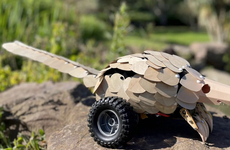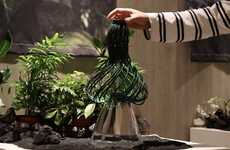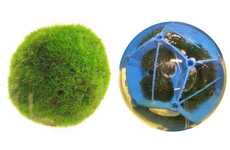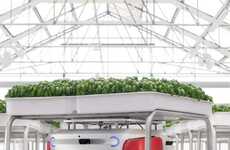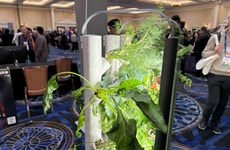
MIT Researchers Invent Elowan — a Machine, Controlled by a Plant
References: harpreetsareen & dezeen
This robotic plant is the latest invention by the Massachusetts Institute of Technology and it is quite exciting. The experiment attempts to fuse the natural environment with the machine world by allowing botanical intervention in a techy landscape. The project is headed by Harpreet Sareen and Pattie Maes who are affiliated with the Fluid Interfaces group at the MIT Media Lab.
The robotic plant is essentially a hybrid system — one that brings together potted greenery and wheeled hardware. MIT attached electrodes to the botanical sample's leaves and stems. Through reactions to environmental changes and fluctuating levels of light, the plant is able to trigger responses that cause the wheels to move in search for optimal light sources. Frequently described as "cyborg botany," the techy project "plugs plants directly into the digital world."
The robotic plant is essentially a hybrid system — one that brings together potted greenery and wheeled hardware. MIT attached electrodes to the botanical sample's leaves and stems. Through reactions to environmental changes and fluctuating levels of light, the plant is able to trigger responses that cause the wheels to move in search for optimal light sources. Frequently described as "cyborg botany," the techy project "plugs plants directly into the digital world."
Trend Themes
1. Cyborg Botany - This trend explores the fusion of natural environment with the machine world, creating opportunities for developing hybrid systems.
2. Botanical Intervention - This trend focuses on integrating plants in the techy landscape, allowing them to trigger responses and interact with the digital world.
3. Robotic Plant Hybrids - This trend involves the creation of machine systems that combine potted greenery with wheeled hardware, resulting in innovative solutions for optimizing plant growth.
Industry Implications
1. Agriculture - The agriculture industry can leverage cyborg botany to develop smart farming systems that optimize plant growth and resource utilization.
2. Technology - The technology industry can explore botanical intervention to create innovative products and devices that integrate plants and digital world interactions.
3. Environmental Monitoring - The environmental monitoring industry can benefit from robotic plant hybrids to develop systems that use plants as sensors for measuring and analyzing environmental changes.
2.9
Score
Popularity
Activity
Freshness

